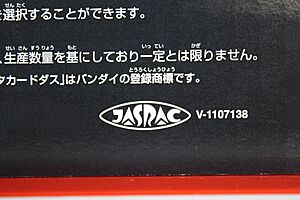Japanese Society for Rights of Authors, Composers and Publishers facts for kids
 |
|
| licensing and royalties | |
| Founded | 1939 |
| Headquarters | 3-6-12 Uehara, , |
|
Key people
|
Haku Ide (Chairman) |
The Japanese Society for Rights of Authors, Composers and Publishers, often called JASRAC, is a Japanese organization that helps manage music copyrights. It was started in 1939 as a group that doesn't aim to make a profit. JASRAC is the biggest organization in Japan for managing music copyrights.
Contents
What JASRAC Does
JASRAC's main job is to look after the copyright rights for songwriters, lyricists, and music publishers. These rights include things like recording songs and performing them live. JASRAC helps people get permission to use music. It also collects money from those who use the music and then gives that money to the artists and creators.
JASRAC also makes sure that people don't use music without permission. If someone uses music illegally, JASRAC takes action. Because JASRAC is a foundation, it follows special rules for non-profit groups.
The main office of JASRAC is in Shibuya, Tokyo. This building is owned by the Masao Koga Music Cultural Memorial Foundation. JASRAC also has 22 smaller offices in big cities across Japan. JASRAC was created in 1939. It is the oldest company in Japan that manages music copyrights.
JASRAC's History
The "Plage Whirlwind"
In 1899, Japan joined an international agreement called the Berne Convention. This agreement helped protect copyright laws. However, there wasn't a clear way to pay artists when their recorded songs were played live.
In 1931, a German teacher named Wilhelm Plage started a group in Tokyo called "Plage Institution." He wanted to manage copyrights in Japan for European music. The Plage Institution started asking for money from businesses that used music. This included radio stations and orchestras.
Plage's requests for money were not official and sometimes forceful. This made it hard to use music from outside Japan. Even NHK, a big broadcasting company, had trouble agreeing with the Plage Institution. They couldn't broadcast foreign music for over a year. Plage also tried to get Japanese artists to let his group manage their copyrights. He wanted to collect money and manage copyrights properly. But he couldn't get along with the music users. This also caused problems with Japanese artists. These events were called the "Plage Whirlwind." They showed that Japan needed a proper way to manage music copyrights.
Creating Copyright Laws
To fix the situation, a new law was made in 1939. It was called the copyright brokerage act. This law said that only groups with permission from the government could manage copyrights. The Great Japanese Music Copyright Association was then started in 1940. This group was the beginning of JASRAC.
Plage was no longer allowed to manage copyrights. He was fined for breaking the new law and left Japan in 1941. The government gave permission to four groups, including the Great Japan Music Association, to manage copyrights. They didn't allow other groups to join. This made managing music copyrights a special job for the Great Japan Music Association.
Music on Video Websites
In 2006, JASRAC took legal action against YouTube. They asked YouTube to remove nearly 30,000 videos. These videos used songs or clips that broke the copyright rules of several music companies. These companies included Sony Music Entertainment Japan, Avex Japan, Pony Canyon, JVC Victor, Warner Japan, Toy's Factory, and Universal Japan.
JASRAC Awards
The JASRAC Awards started in 1982. These awards celebrate the lyricists, composers, and music publishers whose works earned the most money from JASRAC. This money comes from things like music being shared, used in karaoke, or featured in commercials. The awards are given out each year.
- Gold, Silver, and Bronze awards go to the top three of the ten domestic songs that earned the most money.
- The International Award is for the Japanese song that earned the most money from copyright groups overseas.
- The Foreign Work Award is for the non-Japanese song that earned the most money in Japan.
In 2003, the background music for Hayao Miyazaki's Spirited Away won the Gold Award. It was the first time an instrumental song won this award. In 2012, JASRAC honored SMAP's song "Sekai ni Hitotsu Dake no Hana." It was the song that had earned the most money in the awards' 30-year history.
As of 2025, five songs have won the Gold Award for two years in a row:
- Eiko Segawa's "Inochi Kurenai" (1988 and 1989)
- SMAP's "Sekai ni Hitotsu Dake no Hana" (2004 and 2005)
- AKB48's "Heavy Rotation" (2012 and 2013)
- LiSA's "Gurenge" (2021 and 2022)
- Yoasobi's "Idol"
See also
 In Spanish: Sociedad Japonesa de Derechos de Autores, Compositores y Editores para niños
In Spanish: Sociedad Japonesa de Derechos de Autores, Compositores y Editores para niños
 | DeHart Hubbard |
 | Wilma Rudolph |
 | Jesse Owens |
 | Jackie Joyner-Kersee |
 | Major Taylor |



